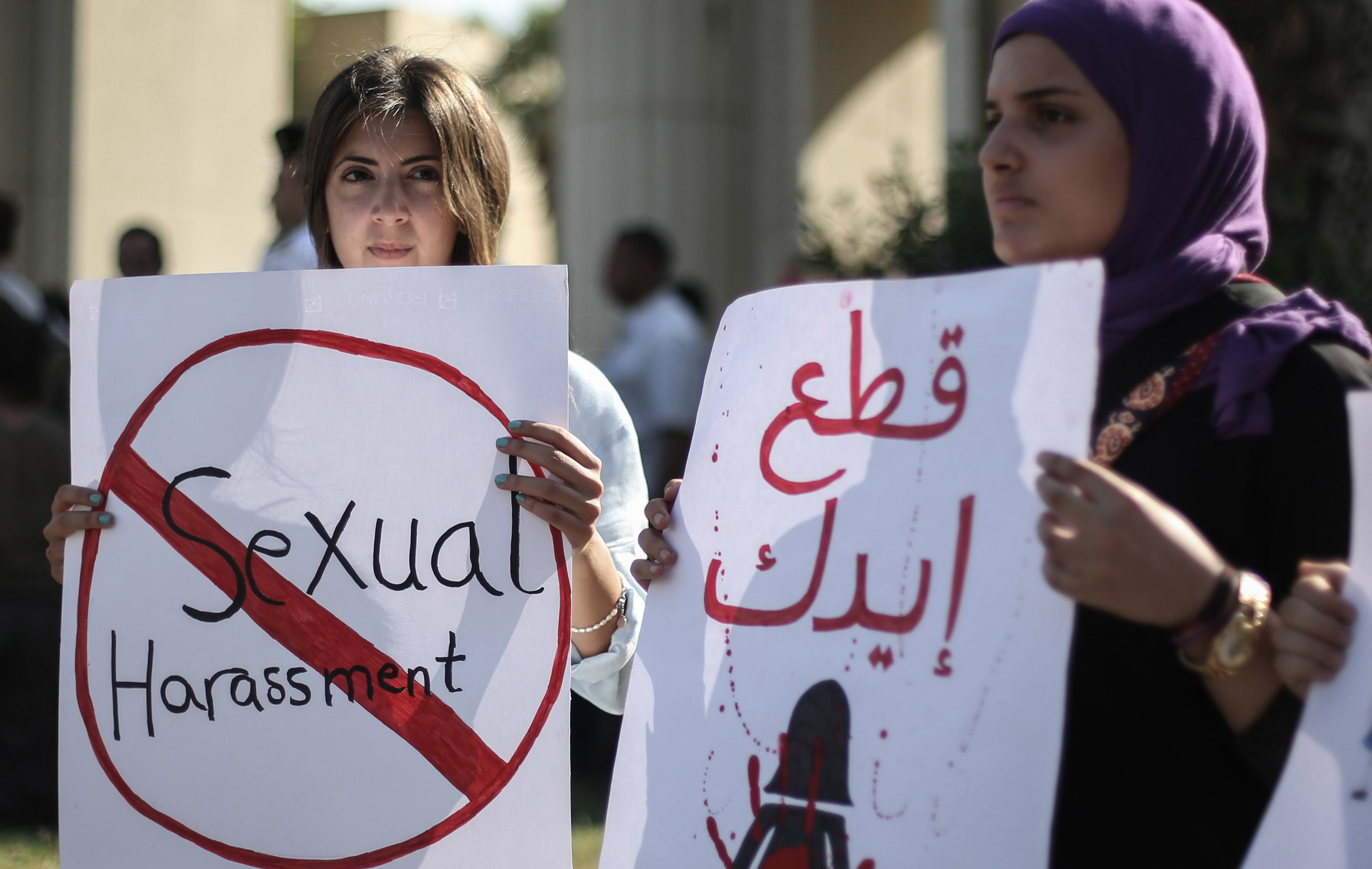انتشر يوم 9 مارس 2021 فيديو لشخص تكشفه كاميراتُ المراقبة، وهو يقوم بالتحرُّش بطفلةٍ في مَدْخَل مبنًى، قبلَ أنْ يُفتَضَحَ أمرُه مِن سيّدتين.
وبينما يسعى البعضُ إلى المنافسة وتحقيق السَّبْقِ الصحفيّ أو مُجاراةِ الضغط الذي تمارسُه شبكاتُ التواصل الاجتماعي، يستدعي الموقفُ رصْدَ المُعْضِلاتِ الأخلاقيّةِ التي تواجهُ الصحفيَّ إزاءَ القضايا الحسّاسة، ومحاولةَ وضْعِ منهجيّةٍ واضحةٍ تسـاعدُه علـى اتّخاذ القرار الأنسبِ أخلاقيًّا ومِهنيًّا.
الفيديو الذي تمَّ تداوُلُه على مواقعِ التّواصلِ الاجتماعي وعبْرَ المواقعِ الإخبارية؛ فَرَضَ عددًا من الأسئلة المهنية؛ حول آلية التعامُل صحفيًّا معه.
في مثل هذه الحالات؛ ليس ثمّة رأيٌ حاسمٌ، إنما ثمّةَ نقاشٌ جدليٌّ حولَ كلِّ قرارٍ على حدةٍ. ويمكنُ حصرُ قراراتِ نشْرِ الفيديو مع كشْفِ الصورةِ واسمِ المُتَّهَم أو نشْرِه بدون كشْفِ هويّته؛ في مذهبين فلسفيين مختلفين:
١- مذهب الأخلاق الواجبة Deontological ethics (Duty-Based): يفترِضُ هذا المذهبُ أنّ الحُكمَ على أخلاقيّةِ الفعلِ ينبغي أنْ يتمَّ بالحُكْم عليه نفسِه، دونَ النَّظَرِ لعواقبِه. وفي هذه الحالة، فالقاعدةُ تقولُ بضرورةِ إخفاءِ هُويّةِ المُدانين والمتهمين، حتّى يَبُتَّ القضاءُ في قضاياهم؛ إذ لا يجوزُ للصّحفيّ أنْ يَنْتَهِكَ "قرينةَ البراءة".
٢- مذهب العاقبة الأخلاقية Utilitarianism (Consequentialism): ويحتكمُ هذا المذهبُ إلى قاعدة أنّ الفعلَ الأخلاقيّ نفسَه يتمّ تقييمُه بناءً على أخلاقيّة العاقبةِ المتوقَّعِ أن تترتَّبَ عنه، لا على طبيعة الفعلِ نفسه. وفي حالتنا هذه؛ فإنّ اتّخاذَ الصحفيّ قرارًا بنشر صورةِ المعتدي على الطفلة ينطلقُ من تبريرٍ أخلاقيٍّ، يرى أنّ المصلحةَ العامة يتم خدمتُها بشكل أكبر في حال فضح مرتكبي أفعال مشابِهة والتشهير بهم؛ كوسيلة ردْع لغيرهم. (ويمكن الاستدلال عليها بسرعة اعتقال المتحرِّش في مصر بعد تداوُل الفيديو)، ثم إنّ هذا المذهبَ يتأسس كموقف تجاه القضايا الأخرى التي ربما كانَت أفظعَ، لكنْ لم يُتَّخَذْ أيُّ إجراءٍ قانونيّ بحقّ مرتكبيها؛ لأنها بقيتْ في الظلام ولم يعرفْ عنها أحدٌ.
وبين هذين المذهبين، يمكن تلخيصُ تداخُلات القضية في ثلاثة أبعاد أساسية: الأخلاقياتُ الصحفية، والقانونُ، والممارسةُ المِهنية. وسنتطرّق لكل منها بالتفصيل؛ كي يتسنّى للصحفيين الاستفادةُ من تجربة هذه الواقعة عندَ الكتابة حول وقائعَ مشابِهة.
في البُعد الأخلاقي مهنيًّا، برز سؤالان أساسيّان:
السؤال الأول: هل كان ينبغي للمواقع الإخبارية نشرُ فيديو خادشٍ للحياء العام أو لا؟
في مثل هذه الحالات نلجأُ إلى الموازنة بين المصلحة العامة (كشف انتهاك أو جريمة)، والمصلحة الخاصة (حماية خصوصية الأفراد في الفيديو). وبما أنّ الجريمة لها أهميّتُها؛ لأنها تقع على فئةٍ مستضعَفةٍ مجتمعيًّا، فيمكن اعتبارُها تهديدًا للأمن المجتمعيّ، وهنا كان قرارُ نشر الفيديو يكتسب مزيدًا من الشرعية.
كما ينبغي الأخذُ بعين الاعتبار أنّ الضحيّةَ وذويها يعيشون تحت وقْعِ الصدمة، ويجب التفكيرُ بالأضرار المحتمَلة إذا تمّ التعاملُ مع الفيديو بطريقة غير مهنية. تتضاعفُ أهميةُ ذلك في مرحلةٍ لاحقة؛ إذا ما حاول الصحفيُّ تصويرَ الضحيّة أو إجراءَ مقابلةٍ مع ذويها دون مراعاةِ وضعِهم النفسي والعاطفي وخصوصيتِهم أيضًا. ويجبُ على الصحفيّ ألّا يستغلَّ حماسَ الضحايا وذويهم في الحديث عمّا قاسَوه؛ لعدم وعيهم بما قد يترتّبُ على ذلك من أضرار بعد نشْرِ المقابلات أو الصور أو مقاطع الفيديو.
السؤال الثاني: هل يجوزُ كشْفُ هُويّاتِ مَن ظهروا في الفيديو؟
ظهر في الفيديو أربعةُ أشخاص، هم: الضّحيّةُ والمُتَّهَمُ وسيّدتان، ولكلٍّ منهم تصنيفٌ مختلف:
- بالنسبة لصورة الطفلة الضحية، فإنّ المبادئَ التوجيهية الأخلاقية للصحفيين التي وضعَتها منظمةُ الأمم المتحدة للطفولة تنصُّ على أنه "يجبُ على الصحفيّ -دائمًا- تغييرُ الاسم وإخفاءُ الهوية المرئية لأيّ طفلٍ حُدِّدَ على أنه ضحيّةٌ للعنف أو الاعتداء الجنسي أو الاستغلال"، أي أنه لا يجوز نشر صورة الضحية بوضوح أو إعطاء أي معلومة تساعد على تحديد هويتها بأيّ شكل من الأشكال.
- بالنسبة لصورة المتَّهَم؛ فإنّ القانونَ يمنعُ نشْرَ صورةِ أيّ شخص -مهما كان الجُرْمُ الذي ارتكبه- إلا إذا كانَ ذلك بإذنٍ من القضاء.
- أمّا فيما يتعلَّقُ بصورةِ السيدتين؛ فإنّ احترامَ خصوصية الأفراد يفرضُ على الصحفيين الامتناعَ عن نشْرِ صورِ أيِّ شخصٍ دون موافقةٍ منه؛ ولاسيما أنه ثمة ضررٌ من الممكن أن يلحق بهما؛ سواء بتعريضهما لأي فعل انتقامي أم بالتشهير.
في البُعْد القانونيّ برزَت التحدياتُ الآتية:
قامَت عدّةُ مواقعَ إخباريةٍ بنشر اسم المُتَّهَم قبلَ أنْ يتمَّ توجيهُ التُّهمةِ رسميًّا له، في حين تحظُرُ العديدُ من القوانين الجنائية -عالميًّا وعربيًّا- نشْرَ هُويّةِ المتَّهم (اسمه أو صورته)، قبلَ مثوله أمام المحكمة والترافُع؛ احترامًا لقرينةِ البراءة، وكذلك لمَنْعِ أيِّ ضررٍ على الشخص؛ قبلَ أن تقرِّرَ سلطةُ الادّعاءِ محاكمتَه.
ولا بدَّ من التذكير هنا، أنّ الفيديو الأصليَّ حُذِفَ من منصة فيسبوك، الأمرُ الذي مِن المحتمَل أنّه يتعلّقُ باعتبارِ نَشْرِ الفيديو -قبلَ توجيهِ التُّهمة رسميًّا للشخص الذي يظهر فيه، وهو يقوم بفعل التحرّش- تشهيرًا.
وعلى الرغم من أنّ الفيديو يُعتبَر دليلًا واضحًا على ارتكابِ الجريمة، إلّا أنّه في المحكمة لا يتمّ الاعتدادُ به دليلًا لإثباتِ الواقعةِ؛ إلّا مِن خلالِ شهادة خبيرٍ يروي محتوى الفيديو أمامَ القاضي، ويتمُّ الأخذُ به كقرينةٍ؛ على سبيل الاستئناس فقط.
كما أنّ إطلاقَ مصطلحاتٍ تُثَبِّتُ على المتّهم قيامَه بالجريمة -قبل محاكمته- مثل: "مُرتكب، منفِّذ، مجرِم"، يُعتبَر انتهاكًا لقرينة البراءة لدى المتّهَم. فالقاعدةُ القانونية تقولُ: إنّ المتّهمَ بريءٌ حتى تَثْبُتَ إدانتُه؛ بمعنى أنه يجبُ على المؤسسات الصحفية الالتزامُ بتراتبية الإجراءات القضائية، والانتظارُ إلى حين أنْ يحدِّدَ القضاءُ إذا كان المتهم مُذْنِبًا بالجُرم المسنَد إليه، قبلَ أن يتم استخدام المصطلحات السابقة.
وفي البُعْد المِهْنِيّ برزَتِ التّحدياتُ الآتية:
الدِّقَّةُ مقدَّمَةٌ على السَّبْق، ولا بدّ للصحفيّ من الموازنة بين السُّرعةِ في نقْل الخبر الذي يتم تداوُله على نطاقٍ واسع، وبين التأنّي للتحقُّق من الفيديو بالدرجة الأولى، ومن ثَمَّ فهْم السياق بعيدًا عن أيّ مشاعر قد تؤثّر على سلامة التغطية.
أمّا بالنسبة لصحة المحتوى؛ فثمةَ أسئلةٌ أساسيّةٌ يتعيَّنُ على الصحفي أن يُجيبَ عنها؛ للتحقُّق من أيّ فيديو على مواقع التواصل الاجتماعي:
• مَن الذي حَمَّلَ الفيديو؟ هل هو شخصٌ حقيقيٌّ ويمكنُ التحقُّقُ من هُويّتِه؟
• هل يمكنُ التحدُّث إليه؛ لإثبات الواقعة؟
• هل يمكنُ الوصولُ إلى مصدرٍ آخرَ في موقعِ الحَدَثِ أو وُصول الصحفيّ إلى مكانِ الحَدَثِ بنفسِه؟
• هل تمّ رفعُ الفيديو على الشبكة في نفسِ تاريخِ تصويره؟
• هل تم التعرُّفُ على مكان تصويرِ الفيديو؟
• إعمالُ الحِسِّ النَّقْدِيّ للصحفيّ، والتشكيكُ في صحة الفيديو، وقراءةُ السّياقِ الذي نُشِرَ فيه.
لا يمكنُ النَّظَرُ إلى الأمرِ برُمَّتِه من زاويةِ الصّوابِ أو الخطأ، لكنّ أخلاقيّاتِ المهنةِ تستدعي عدمَ التَّسَرُّعِ، وتقييمَ القصة الخبريّةِ أخلاقيًّا ومهنيًّا قبلَ تقديمها للجمهور. أيضًا، عدمَ الانسياقِ وراء ضغط الجمهور ووسائل التواصل الاجتماعي.







































